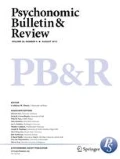Abstract
The present study investigated whether the quality of a frequency change within a sound (i.e., smooth vs. abrupt) would influence perception of its duration. In three experiments, participants were presented with two consecutive sounds on each of a series of trials, and their task was to judge whether the second sound was longer or shorter in duration than the first. In Experiment 1, participants were more likely to judge sounds consisting of a smooth and continuous change in frequency as longer in duration than sounds that maintained a constant frequency. In Experiment 2, the same bias was observed for sounds incorporating an abrupt change in frequency, but only when the frequency change was relatively small. The results of Experiment 3 suggested that the application of a change heuristic when generating duration judgments depends on the perception of change as originating from a single, integrated perceptual object.
References
Adobe Systems (2004). Adobe Audition (Version 1.5) [Computer software]. San Jose, CA: Author.
Bregman, A. S. (1990). Auditory scene analysis. Cambridge, MA: MIT Press.
Brown, S. W. (1995). Time, change, and motion: The effects of stimulus movement on temporal perception. Perception & Psychophysics, 57, 105–116.
Garner, W. R. (1974). The processing of information and structure. Hillsdale, NJ: Erlbaum.
Kleider, H. M., & Goldinger, S. D. (2004). Illusions of face memory: Clarity breeds familiarity. Journal of Memory & Language, 50, 196–211.
Masson, M. E. J., & Caldwell, J. I. (1998). Conceptually driven encoding episodes create perceptual misattributions. Acta Psychologica, 98, 183–210.
Poynter, W. D. (1989). Judging the duration of time intervals: A process of remembering segments of experience. In I. Levin & D. Zakay (Eds.), Time and human cognition: A life-span perspective (pp. 305–331). Amsterdam: Elsevier, North-Holland.
Psychology Software Tools (2002). E-Prime Software System [Computer software]. Pittsburgh, PA: Author.
Reber, R., Zimmerman, T. D., & Wurtz, P. (2004). Judgments of duration, figure-ground contrast, and size for words and nonwords. Perception & Psychophysics, 66, 1105–1114.
van Noorden, L. P. A. S. (1975). Temporal coherence in the perception of tone sequences. Unpublished doctoral dissertation, Eindhoven University of Technology.
Whittlesea, B. W. A. (1993). Illusions of familiarity. Journal of Experimental Psychology: Learning, Memory, & Cognition, 19, 1235–1253.
Witherspoon, D., & Allan, L. G. (1985). The effect of a prior presentation on temporal judgments in a perceptual identification task. Memory & Cognition, 13, 101–111.
Author information
Authors and Affiliations
Corresponding author
Additional information
This research was supported by a Canada Graduate Scholarship from the Natural Sciences and Engineering Council of Canada and a Manitoba Graduate Scholarship to L.C.L. and a grant from the Natural Sciences and Engineering Council of Canada to T.A.M.
Rights and permissions
About this article
Cite this article
Leboe, L.C., Mondor, T.A. The role of a change heuristic in judgments of sound duration. Psychonomic Bulletin & Review 15, 1122–1127 (2008). https://doi.org/10.3758/PBR.15.6.1122
Received:
Accepted:
Published:
Issue Date:
DOI: https://doi.org/10.3758/PBR.15.6.1122

